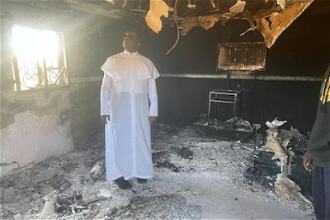Think tank warns of dangers of insurrection by Iraqi people
The theological think-tank Ekklesia has welcomed the intention of the US and UK Governments to facilitate resistance against the Iraqi regime by Iraqi people, but warned that encouraging insurrection without proper training, resourcing and support could end in disaster. In September 2002 Ekklesia set out how a strategy of civilian-based resistance might work in Iraq, on both BBC Radio 4 and in the religious press. It said that active resistance against oppressive regimes has a substantial historical precedent. NGO's have previously pioneered successful strategies of resistance with significant effect. In March 2000 the US based International Republican Institute (IRI) taught activists in Serbia how to strike, communicate with symbols, how to hide from police, respond to interrogation and infiltrate a regimes 'pillars of support' such as the police, media and judiciary. The 'Otpor' members, numbering 70,000 are credited with 'mass underground movement that stood at the disciplined core of the hidden revolution that really changed Serbia'. (See for example Roger Cohen, 'Who Really Brought Down Milosevic', New York Times Magazine, 26th November 2000) According to press reports, Washington is currently doing its utmost to foment rebellion in Basra as part of its effort to portray the war as one of liberation rather than occupation. It has bombarded the city of 1.3 million people with leaflets to encourage the predominantly Shia population to rebel against Saddam's regime. However, the US Government has been remarkably reticent in pursuing such a strategy before now. The Iraq Liberation Act of 1998 gave the US Government authority to provide the Iraqi opposition with goods and services worth up to $97 million, including training. However only $1 million was ever actually used, and there is little evidence that the Iraqi people have had the help and support required to stage resistance and minimise casualties. Historically resistance involves the use of a range of forceful sanctions -such as strikes, boycotts, civil disobedience, disrupting the functions of government, even non-violent sabotage. This can all be incorporated within a strategy for undermining an oppressor's pillars of support. Such measures would be particularly effective if undertaken in co-ordination with aid from outside the country. Such a strategy rests on the premise that an authoritarian regime requires certain services or benefits from the population. Those benefits can be withheld and its ability repressively to compel a population's compliance is not infinite. The conditions for encouraging resistance in Iraq are favourable for the following reasons: 1. Millions of Iraqis detest Saddam Hussein and as such are a huge resource for a movement of resistance. Once an identifiable opposition movement is created, a "tipping point" can quickly be reached, whereby the movement grows at great speed amongst an oppressed population. 2. Saddam is not supported by an entrenched party system. His hold on power is reliant on personal loyalties, patronage and penalties. The frequent reports of his repression are a sign of the disaffection that his style of leadership continues to breed. 3. Although insurrection has been harshly punished there are also examples of successful non-violent resistance in Iraq. A few years ago, in Karbala, tens of thousands of Muslims gathered for an annual religious occasion. The regime sent in troops because it feared disorder or an uprising. But they were so badly outnumbered by the civilians who came that they were effectively encircled-a graphic display of the limitations on Saddam's repressive apparatus if it had to respond to incidents in all directions from Baghdad. 4. Saddam's regime is particularly vulnerable when it comes to oil. In fact the regime cannot function without oil revenues, and there is a limited number of civilian oil workers who, if they were to abandon their jobs, could create a crisis by themselves. It was suggested that a non-violent strategy could work in the following way: 1. A campaign against the regime would begin with co-ordinated, civilian-based incidents of disruption. 2. Incidents would be dispersed around the country, far from Baghdad, and so would not offer convenient targets for repression 3. Attempts to crack down would have to depend on the outermost, least reliable members of Saddam's repressive apparatus, which would be overextended. 4. The realization that Saddam was being opposed openly would begin almost immediately to lessen the fear of engaging in further, more systematic acts of resistance. 5. As opposition became more serious or visible, this would offer to dissenting elements within the regime a place to which to defect, once events reached a crescendo. Speaking about the hope of the US and UK Governments of insurrection in Iraq Ekklesia's director Jonathan Bartley said; "Attempts to encourage resistance by the Iraqi people may seem attractive at first, but to achieve the objective of regime change in a relatively bloodless way, careful planning, co-ordination and strategising are required." He continued: "Despite the massive budget set aside by the US government for resourcing and equipping Iraqi opposition groups, it does not appear that the money has been used to prepare for such a situation as we are now witnessing in Basra. To suddenly pursue a strategy of encouraging the Iraqi people to rise up against the regime now, could result in massive civilian casualties." Source: Ekklesia


















